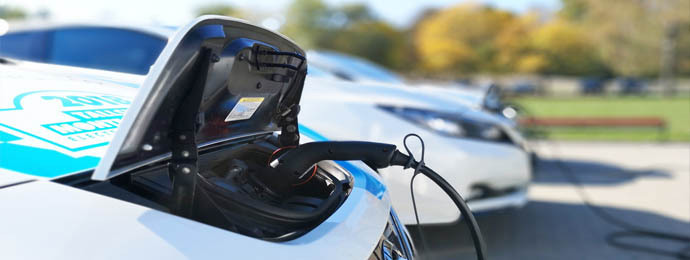Electric car prices in the UK
There are lots of things to consider when buying an electric car, and price is certainly one of them. There are huge savings to be made when going green on things like fuel and road tax rates, but electric car prices can vary drastically depending on the model you choose. With so many different electric car brands available, the choice can be both enviable and a little confusing.
We’ve done all the hard work for you, looking at electric car prices for both buying and car leasing, as well as analysing the cost of running an electric car for your everyday journeys.

Is an electric car really cheaper?
One of the main selling points of an electric car lease is that, in theory, they’re cheaper to run. You don’t need to top up at petrol stations, you don’t need to replace the oil, and you could save hundreds of pounds a year at the pump. But do the numbers really add up to savings worth making?
Electric cars are cheaper per mile than petrol or diesel
In terms of getting from A to B, an electric car lease is a much cheaper option than fuel-powered alternatives. The average price per mile for a petrol car is 14p, while a diesel car is slightly cheaper at 13p. However, when compared to an electric car they fall way back into last place. At only 3.7p per mile, you’re saving a tonne of money on your journey on fuel alone, before you even consider things like tax and servicing.
One thing that is worth considering is the availability of electric charging points. While some hybrids are self charging, other electric-only cars require charging stations that might not be available everywhere you go. It makes sense to plan these charging points in before starting your journey so you don’t end up low on battery.
Electric cars are cheaper for commuting
When you consider those prices in terms of the everyday commute, the money quickly starts to add up. According to the Office for National Statistics, the average UK commute is 18.64 miles a day for 232 days of the year.
In a standard petrol car, that would cost you £605 in fuel per year. In a diesel car it would be £562, while the cost of running an electric car would see you save hundreds of pounds, coming in at only £160 for your annual commute.
Just think of all those extra lunchtime coffees you could afford.
Workplaces can even receive tax benefits for letting you charge your car on their premises, allowing you to fill up your battery before making the journey home.
How much do electric cars cost to buy?
When it comes to buying an electric car, the prices can vary greatly. At the lowest end of the scale, the cheapest electric car is the Smart EQ Fortwo EV, starting at only £20,350. Ideal for an urban lifestyle, Smart were one of the original electric car pioneers, and their latest model delivers everything you’d expect from the iconic brand. Other cheap electric cars include the Skoda Citigo-e, starting at only £20,400, and the Seat Mii Electric, from £22,000.
“Your budget doesn’t have to be big to go green.”

However, if you do have the money to spare, why not treat yourself to luxury car lease deal like the Porsche Taycan for a mere £136,351, or a BMW i8 Roadster for £120,357?
They’re both capable of going very fast, and will ensure your savings accelerate away just as quickly.
What’s the cheapest electric car to lease?
If you’d rather pay a lower monthly cost for an electric car, leasing could be your best option. We’ve got a great range of electric and hybrid lease cars in stock, with our cheapest deal starting from only £168.62* a month for a Seat Mii Electric.
Other affordable electric car lease deals include the Honda Jazz from £182.21*, and the Toyota Corolla Hatchback from £191.26*. You could drive off in a great value electric car for much less than a petrol or diesel alternative, helping you save pounds as well as the planet.
*Prices may vary.
Are electric car MOTs cheaper?
No-one looks forward to MOT time, as it usually means spending a lot of money on fixing problems you never knew you had. However, with an electric car you could see yourself spending a lot less. Data suggests that the price of MOT and servicing is around 49% lower for an electric car, with fewer moving parts leading to less wear and tear.
When you add up the total cost of MOT, refuelling, road tax, insurance and servicing, the amount you pay for a fuel car is around £2,205 a year. For an electric car, that’s 21% less at £1,742.
The numbers all make going green make sense.
Are electric cars cheaper to insure?
The only area that electric cars fail on financially is insurance. On average, the price of insuring an electric car is 45% more expensive than fuel-powered competition. However, as with all car insurance, the price really depends on what kind of driver you are. If you’ve got a good few years of no claims on your side, live in a safe area and do a safe job, the price of insurance for an electric vehicle might not be too much different to a fuel-powered car at all.
Electric cars are generally more expensive to insure due to the parts that make them up. While their lack of moving parts will make them cheaper to have serviced, their core components - such as lithium-ion batteries - cost a lot to repair if they get damaged. Insurance providers will take this into consideration when offering you a deal.
There are also fewer qualified technicians when it comes to electric and hybrid cars. According to research done in 2016, only 1,150 out of all the 240,000 registered mechanics in the UK were trained on electric cars, meaning it could be harder for your insurer to find a garage to fix it if something goes wrong.
This hassle is passed on to you through higher prices.
Are electric cars cheaper to tax?
The best news of all for electric car owners is that they’re absolutely free to tax. While you still need to register them for tax, you won’t need to pay a penny. That’s because road tax is calculated on how much CO2 your car emits, and as an electric car has zero emissions, you’ll pay zero pounds to drive it.
The annual flat rate of road tax is £150, meaning if you drove an electric car for the average lifespan of a car - 14 years - you’d save £2,100 on tax throughout your ownership.
Hybrid cars also benefit from tax cuts, although not to the same extent. As you still use some fuel, your emissions won’t quite be zero (although will still be significantly lower). You’ll save £10 a year on tax, adding up to £140 throughout the lifetime of your car.
Interested in owning an electric car?
If the savings you could make on an electric car are tempting you towards the switch, but you’re still not quite sure, view our library of electric vehicle guides for more information. If you would like to own an electric vehicle but don’t want to buy one outright, take a look at our latest hybrid and electric car lease deals to get behind the wheel of a lean, green, money saving machine.
Guide Information
Originally published: 12th January 2021
Last updated: 20th May 2022
